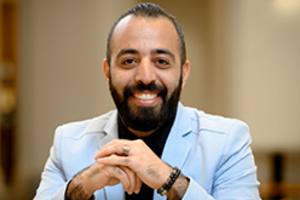
Career shifts come in different forms, and for Eskandar Ataallah, the shift was personal. Ataallah, a first-year MGA student from Syria, went from the field of economics to humanitarian services when conflict broke out in his home country. In this student spotlight, Ataallah details his journey with advocacy work, the aftermath of the 2023 Turkey-Syria earthquakes, and his hopes for peace in Syria and beyond.
You undertook a major career shift. What was that like and what did you do?
When fighting commenced in Syria, I started working with the Greek Orthodox Patriarchate of Antioch, which aims to work in relief and development for the most vulnerable families and individuals. It was jarring at first, to go from economics to relief services, but I adjusted. From that experience, I focused on social cohesion and gender at the United Nations Development Programme. There were many thematic areas specific to Syria that needed more attention if we were to curb the violence.
And that led you to today?
Yes. I spent more than eight years in the humanitarian field. At one point, I realized that my field experience needed to be tied to an academic background. I wanted to learn and develop the theory behind the work I was doing. A new environment would help generate new ideas. A search for international studies and development programs led me to the Kroc Institute.
Why study peace, specifically?
I wanted to understand how to manage and engage interest in diversity, social cohesion, and community, all of which are tied to peacebuilding. To foster peace, it’s important to understand its components. Though I already had a background in peace work through my participation in numerous workshops, training, and NGO engagements inside and outside of Syria, I still wanted to know more about how peacebuilding and how other concepts, like religion, are connected and sustainable. Whenever I would search for peace interventions, organizations, or talks, the Kroc Institute was not only present but leading. The Kroc Institute is everywhere in the peace world.
Since beginning your studies at the Kroc Institute, you have continued to work with Syrian organizations, especially during the aftermath of the 2023 earthquakes. Can you share with us a bit about your work?
Some of the most important things I built back home are my connections. Networks are invaluable. After the earthquake in February 2023, I intervened directly with the Syrian speed response team. This team helped me navigate and organize relief deliveries to the most vulnerable and taught me how to amplify calls for action and supplies. Being the person to provide information and organize here in Indiana has proven how essential networks and connections are.
What has the response been like to the recent earthquake?
Back home, it was a bit scattered. Everyone wanted to help but did not know how, especially with blockades in place. Not everyone was receiving aid consistently. Aid was piling up in one area while being nonexistent in another. The humanitarian field still has work to do to address these gaps. We need more inclusive advocacy. Not only was Syria’s suffering overshadowed by Turkey’s in terms of international response and conversation, but even within Syria, one area was “legitimized” over others. Humanitarians shouldn’t have these biases; we should provide help to people who need it regardless of politics.
Considering what you have learned thus far in your master’s program, what path forward do you see for Syria? How has your view on peace shifted?
When I arrived in August, I was deflated. I thought that the conflict in Syria was unsolvable. However, now that I am nearing the conclusion of my second semester, I’m regaining hope. The classes I took during my first semester were arenas for skill sharpening and expansion. Concepts like strategic peacebuilding, negotiation, and mediation help in complicated conflicts. Now I see that we can, as peacebuilders, approach conflict like pieces of a puzzle, with different tools for each piece. For Syria, specifically, I can see mediation, truth commissions, and peace project design playing a part in mitigating the violence. Conflict mapping and analyzing are vital tools, although Syria seems too complex to map. Every bit helps, however, and I truly think it will help, eventually.
With these new tools and revived hope, where do you see yourself after graduation?
I see myself ready for the next phase in Syria when we take steps forward for peace. I have gained new tools for engaging in ethically responsible and strategic peacebuilding that I want to bring home to Syria. One thing I have learned in this program is that peace needs adaptability, so I will adapt to what is needed.
Finally, what can those outside of Syria do to support the peace process?
Research the situation in Syria and advocate. We need people from all types of backgrounds and education to talk about Syria. We cannot rely on earthquakes to resurrect our situation back into the news. Post a photo on social media. Bring it up at the dinner table. Attend any cultural or news events related to Syria. Keep talking about Syria, because that can inspire change at the top levels